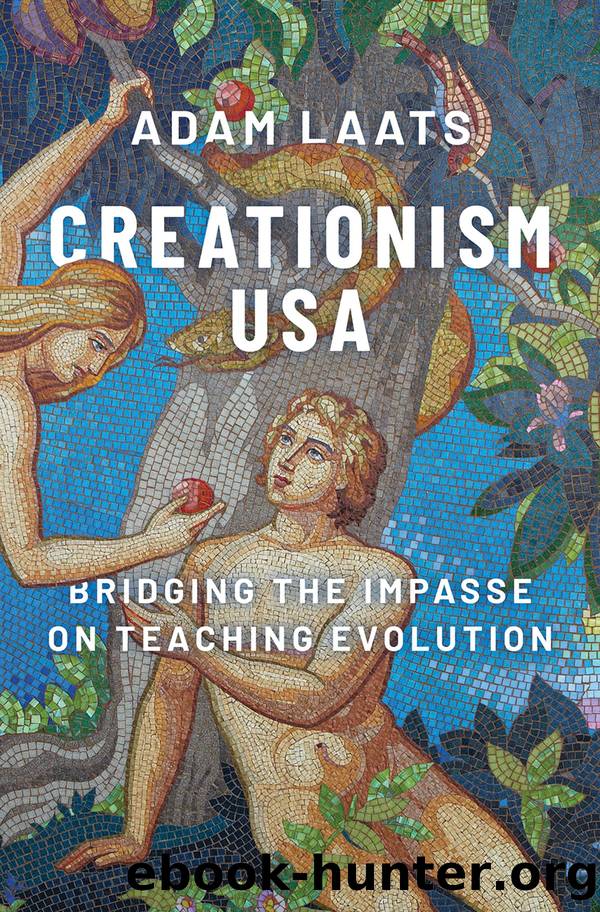Creationism USA by Adam Laats

Author:Adam Laats
Language: eng
Format: epub
Publisher: Oxford University Press
Published: 2020-09-15T00:00:00+00:00
What Scientists Say
Let’s start with an eye-opening experiment carried out by the folks at the National Science Board (NSB). The NSB is the governing body of the National Science Foundation, the federal government’s organization that funds and supports American science. Among the NSB’s many missions is to estimate America’s knowledge about science. It is charged with telling the president what Americans know about science and what we don’t know. To find out, the NSB pores over survey data.
And, unlike science celebrities like Richard Dawkins and Bill Nye, the folks at the NSB recognized a problem when they saw one. Too often, asking people about evolution led to skewed results. It was difficult not to notice. When the NSB split its results between people who identified as not very religious and very religious, the problem became starkly clear.
On most science questions, there was not much difference between what religious people knew and nonreligious people knew. They tended to look the same, statistically, when asked if electrons are smaller than atoms. (They are.) They tended to look the same when asked what the main ingredient in our planet’s atmosphere was. (It’s nitrogen.) And they tended to look the same when asked about the relationship between positive results on mammograms and breast cancer. (It’s complicated.) But here’s the kicker: When Americans are asked if humans evolved from “earlier species of animals,” we see a predictable divide. Nonreligious people tend to “know” the answer is yes. Very religious people tend not to “know” it.13
What does that tell us? If we are ardent anti-creationists, like Richard Dawkins, we might say that creationists have a weird kind of intellectual blind spot. They know some scientific ideas, but they refuse to know evolution.
But the more reasonable minds among us smell a rat. The problem isn’t with creationists’ knowledge; the problem is with this sort of test question itself. The other questions—electrons, nitrogen, mammograms—are generally seen as God-neutral. But evolution isn’t. For some creationists, as we saw in chapter 3, to say they “know” that humans evolved would mean saying they don’t believe in their religion. For some, to say they “know” evolution occurs means to give tacit approval to things such as abortion, homosexuality, drug abuse, and even organized crime. When they say that evolution is “false,” do they mean they don’t know that scientists think such things? Are they saying that scientists are wrong? Or are they saying—for whatever reason—that they just won’t accept what those scientists say? It’s impossible to tell from the simple true-false survey question.
What was the NSB to do? They wanted to produce a trustworthy guide to the level of Americans’ knowledge about science. They understood that asking people about evolution told them more about people’s religious beliefs than about their science knowledge.
In 2010, they punted. Their results were about the same as always. Just over half of Americans (55 percent) said that humans had not evolved. And a whopping two-thirds said that the universe had not begun with a “huge explosion.”
Download
This site does not store any files on its server. We only index and link to content provided by other sites. Please contact the content providers to delete copyright contents if any and email us, we'll remove relevant links or contents immediately.
Christian Ethics by Wilkens Steve;(860)
Christian Ethics for a Digital Society by Kate Ott(779)
Fearfully and Wonderfully Made by Philip Yancey & Paul Brand(771)
God and the Multiverse by Victor J. Stenger(676)
Numbers by Ronald B. Allen(640)
How to Read Slowly by James W. Sire(617)
Christian Ethics: An Introduction to Biblical Moral Reasoning by Wayne Grudem(598)
The City of God by Saint Augustine & Marcus Dods(591)
Monastic Archaeology by Unknown(568)
Morality by Jonathan Sacks(567)
The Technological System by Jacques Ellul(550)
Amish Grace by Donald B. Kraybill & Nolt Steven M. & Weaver-Zercher David L(535)
Death of the Doctor by Unknown(527)
The Disabled Church by Rebecca F. Spurrier;(523)
Jesus: A New Vision by Whitley Strieber(522)
Children of Lucifer; The Origins of Modern Religious Satanism by Ruben van Luijk(513)
Critical Writings by Joyce James;(503)
Redeeming Sociology by Vern S. Poythress(488)
The Church in the Early Middle Ages by G.R. Evans(478)
